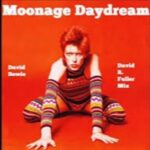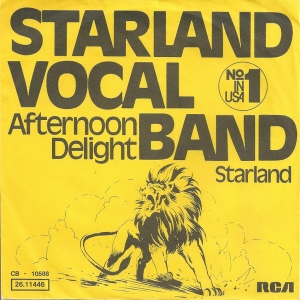 When David Bowie unleashed “Moonage Daydream” in 1972, the world wasn’t ready—but that was precisely the point. It wasn’t just a song; it was an arrival, a glitter-covered transmission from a strange new world where rock, art, and identity collided in cosmic fashion. This was the birth cry of Ziggy Stardust—the alien rock star who would burn bright and brief—and “Moonage Daydream” was his theme song, his mission statement, his explosion into our collective consciousness.
When David Bowie unleashed “Moonage Daydream” in 1972, the world wasn’t ready—but that was precisely the point. It wasn’t just a song; it was an arrival, a glitter-covered transmission from a strange new world where rock, art, and identity collided in cosmic fashion. This was the birth cry of Ziggy Stardust—the alien rock star who would burn bright and brief—and “Moonage Daydream” was his theme song, his mission statement, his explosion into our collective consciousness.
To this day, few songs in Bowie’s vast catalog capture his genius as completely as “Moonage Daydream.” It’s not his biggest hit, but it might be his most defining—a sonic and lyrical blueprint for everything he’d become. It’s where his theatricality, sexuality, and sci-fi mysticism fused into a single piece of music that felt like it came from the future.
This track wasn’t made for casual listening. It’s not polite. It’s loud, strange, sensual, and utterly unapologetic. It’s the sound of rock and roll transcending its earthly form and blasting off into orbit.
The Birth of Ziggy
When The Rise and Fall of Ziggy Stardust and the Spiders from Mars hit shelves, Bowie was already a master of reinvention. He had tried folk, psychedelia, cabaret—but Ziggy was something else entirely. This was a fully realized world, complete with mythology, characters, and apocalyptic grandeur. “Moonage Daydream” sits right in the heart of that world.
Originally recorded as a single in 1971 under the name Arnold Corns (an early Ziggy prototype), Bowie reimagined the song a year later for Ziggy Stardust. The second version was rawer, tighter, and far more confident. It opened with a snarling guitar riff from Mick Ronson that sounded like a meteor strike, followed by a vocal performance that was equal parts seduction and sermon.
Bowie introduces himself as the cosmic messiah we didn’t know we needed:
“I’m an alligator / I’m a mama-papa coming for you.”
It’s a line that immediately sets the tone—feral, androgynous, and defiant. Ziggy isn’t just here to sing; he’s here to invade.
The Sound of Stardust
The genius of “Moonage Daydream” lies in how it sounds like a journey through space and time. It starts grounded—gritty and guitar-driven—but slowly builds into something ethereal and transcendent. Producer Ken Scott and Bowie created an atmosphere that feels both futuristic and primal, combining old-school rock swagger with otherworldly textures.
Mick Ronson’s guitar work deserves special mention—it’s volcanic. His riffs snarl and scream, his solo burns like a dying star. Yet Ronson was more than just a guitarist; he also arranged the orchestral parts that elevate the song into the stratosphere. When the strings swell behind the guitar solo, it feels like the universe itself is expanding.
Trevor Bolder’s bass and Mick Woodmansey’s drums anchor the chaos, keeping everything from spinning completely out of control. This balance—the raw with the refined, the human with the alien—is what makes the track so hypnotic.
And then there’s Bowie’s vocal. He doesn’t sing “Moonage Daydream”—he inhabits it. His phrasing is playful and commanding, almost conversational one moment and operatic the next. You can hear the smirk in his voice, the confidence of a man who knows he’s rewriting the rulebook.
Lyrical Chaos and Cosmic Poetry
The lyrics to “Moonage Daydream” are as bizarre as they are beautiful. They read like transmissions from another dimension, filled with sexual energy, surreal imagery, and prophetic undertones. It’s part love song, part alien manifesto.
“Keep your ‘lectric eye on me, babe / Put your ray gun to my head.”
That’s not a normal romantic line—it’s pure Bowie. It’s sci-fi eroticism at its finest, mixing danger and desire until they’re indistinguishable. He’s inviting his lover into an experience that’s thrilling and terrifying, as if love itself might cause an explosion.
“Press your space face close to mine, love / Freak out in a moonage daydream, oh yeah.”
It’s an anthem of cosmic liberation. Bowie isn’t describing a simple romance—he’s describing transformation, transcendence. “Moonage Daydream” becomes an invitation to shed your earthly form and join him in the glittering void.
Every line is packed with references and metaphors that mix the sacred and profane. The “alligator” and “space invader” are both wild and playful, symbols of an unleashed, boundaryless identity. In true Bowie fashion, he makes the absurd feel profound.
The Guitar Solo That Touched the Stars
If Bowie’s voice is the soul of “Moonage Daydream,” then Mick Ronson’s guitar solo is its beating heart. It’s one of the great moments in rock history—soaring, emotional, almost cinematic in scope.
Ronson starts with delicate bends, almost hesitant, then gradually builds into full-blown transcendence. His playing has melody, structure, and raw power, but there’s also vulnerability there. It’s as if the guitar is weeping and celebrating at once.
According to Bowie, Ronson’s solo was played straight through with minimal overdubs—a spontaneous burst of brilliance. It’s hard to overstate how essential Ronson was to Bowie’s early sound. The combination of his guitar and Bowie’s vision was lightning in a bottle, something neither would ever fully replicate again after Ziggy.
The Soundtrack to Stardust’s Mission
Within the narrative of The Rise and Fall of Ziggy Stardust, “Moonage Daydream” serves as Ziggy’s introduction to the world. It’s the part where the alien rock star first arrives on Earth, ready to save humanity through music and sex and spectacle.
You can feel that energy in the arrangement. The song grows larger and larger as it progresses, like a rocket ascending into orbit. The climax—Ronson’s guitar colliding with Bowie’s soaring “oh yeah”—feels like liftoff. It’s pure euphoria.
But beneath the glam and glory lies something deeper: the sense that Ziggy’s mission is doomed. There’s a haunting quality to the production, a melancholy undercurrent beneath the glitter. This wasn’t a hero who would last; this was a comet destined to burn out.
Influence That Echoes Across Galaxies
“Moonage Daydream” didn’t just define Bowie’s Ziggy era—it reshaped what rock music could be. It gave permission for artists to be theatrical, experimental, and unapologetically weird. You can hear its DNA in everything from Queen’s flamboyant showmanship to the sci-fi punk aesthetic of bands like The Smashing Pumpkins and Muse.
When Bowie performed it live, it was electric. The 1973 Ziggy Stardust and the Spiders from Mars concert film captures him at his most magnetic—Ronson shredding beside him, the crowd in a state of delirium, the song vibrating like a cosmic hymn. It became one of his most powerful live numbers, a setlist staple that never lost its spark.
The song’s influence also extends far beyond music. It inspired the title of Brett Morgen’s 2022 documentary Moonage Daydream, which explored Bowie’s artistic life in kaleidoscopic form. The film used the song as a central motif, a reflection of Bowie’s eternal drive to explore the unknown.
A Love Letter to the Outsiders
At its heart, “Moonage Daydream” is a love letter to anyone who’s ever felt like they don’t belong. Bowie was always the champion of the misfits, the dreamers, the ones who lived just left of center. Ziggy Stardust gave them a hero—a beautifully strange alien who turned otherness into art.
When Bowie belts out, “Freak out in a moonage daydream,” he’s not just telling you to lose yourself—he’s giving you permission to exist without apology. It’s a rallying cry for the weird, the queer, the unconventional. Long before inclusivity became a buzzword, Bowie was living it on stage, glitter and all.
“Moonage Daydream” became more than a song; it became an identity. For many fans, it was the first time they saw themselves reflected in popular culture—powerful, confident, and defiantly unique.
The Cosmic Duality of Bowie
What makes “Moonage Daydream” so compelling is how it encapsulates Bowie’s duality. It’s loud but thoughtful, sexy but spiritual, ridiculous but profound. Bowie always existed between worlds—male and female, human and alien, art and pop—and this song is the sound of that in-betweenness.
It’s no coincidence that the song feels both euphoric and slightly tragic. That was Bowie’s genius: to make beauty and despair dance together. The grandeur of “Moonage Daydream” isn’t just in its sound; it’s in its emotional complexity. It captures the ecstasy of transformation but also hints at the loneliness of existing outside the norm.
Bowie once said that Ziggy Stardust was “an instant star,” but that stardom destroyed him. “Moonage Daydream” feels like the moment before that fall—the spark before the flame consumes everything.
Why It Still Feels Like the Future
More than fifty years later, “Moonage Daydream” still sounds ahead of its time. Its fusion of rock, orchestral flourishes, and surreal lyricism paved the way for countless artists who blurred genres and gender lines. It’s a reminder that Bowie wasn’t just making music—he was expanding what music could mean.
The song’s message of freedom, self-expression, and cosmic curiosity remains as vital as ever. Every generation finds its own meaning in it. To some, it’s a celebration of individuality; to others, it’s a symbol of artistic transcendence. For many, it’s simply the sound of David Bowie being David Bowie—uncontainable, visionary, and always just a few steps ahead of everyone else.
When that final “oh yeah” rings out, it’s not just the end of a song—it’s a signal from the stars, echoing through time.
The Final Glow
“Moonage Daydream” is more than one of Bowie’s best songs—it’s one of rock’s purest expressions of imagination. It’s the kind of track that refuses to age because it was never really of this earth to begin with.
It’s theatrical without being pretentious, romantic without being sappy, and strange without ever losing its soul. It’s a masterclass in world-building, musicianship, and emotional intensity—all wrapped in the glittering package of glam rock perfection.
When Bowie howls those last notes, you can almost see Ziggy Stardust, bathed in spotlight, about to ascend into myth. It’s the moment when music stops being entertainment and becomes transcendence.
Final Verdict: “Moonage Daydream” isn’t just a highlight of The Rise and Fall of Ziggy Stardust and the Spiders from Mars—it is the heartbeat of the record. It’s one of those rare



